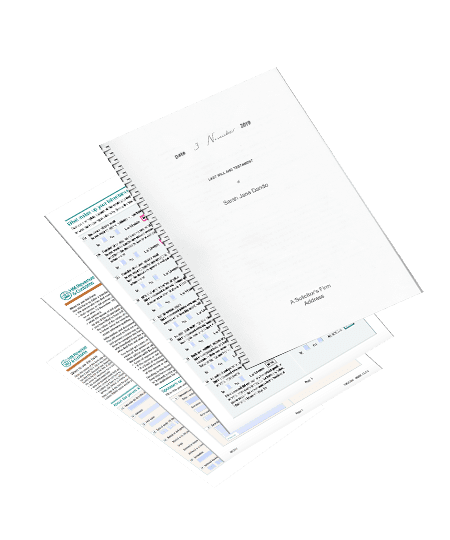
You have been appointed an Executor
Being named an executor for someone’s estate can feel daunting at first, especially if it is a surprise. However, it needn’t be overwhelming.
With a bit of planning and guidance when you need it most, you can apply for a Grant of Probate and administer the estate without the need to appoint a solicitor.
If you have been named as an executor then you have come to the right place for sensible, cost effective help and support in carrying out your role.
Here are some frequently asked questions:

What is Probate?

If you are an executor of a will you need the authority of the Probate Court before you can start dealing in any significant way with the estate i.e. collecting, transferring, selling or distributing the assets in the estate. Obtaining the Court’s permission is called obtaining ‘grant of probate‘. Asking for the Court’s permission is called ‘applying for a Grant of Probate‘. Confusingly, people often refer to the entire process, from the application for a Grant of Probate to the final distribution of all the assets in the estate to the beneficiaries, as ‘Probate’.
There are circumstances where no Grant of Probate is required but these circumstances are not dealt with in this answer.
I can help you with the forms so that you are confident that you have applied for a Grant of Probate correctly.

Getting Probate - what does that mean?
 Before you apply for the Grant of Probate you will need to obtain a reasonable valuation of the assets of the estate, the details of which you will submit to the Inland Revenue by completing the relevant Inheritance Tax (IHT) form. You will then submit the relevant forms either online or directly to the Probate Registry as well as sending the original will to the Probate Registry. If the Court is satisfied that the will is valid it will issue the Grant of Probate.
Before you apply for the Grant of Probate you will need to obtain a reasonable valuation of the assets of the estate, the details of which you will submit to the Inland Revenue by completing the relevant Inheritance Tax (IHT) form. You will then submit the relevant forms either online or directly to the Probate Registry as well as sending the original will to the Probate Registry. If the Court is satisfied that the will is valid it will issue the Grant of Probate.
You will need to pay a fee. See How do I pay for things before Grant of Probate?
I can help you with the forms so that you are confident that you have completed the IHT form and application for Grant of Probate appropriately.

Do I need to appoint a solicitor to apply for the Grant of Probate?
 No.
No.

Can I do the application for Grant of Probate myself?
 Yes, you can. It is a myth that this can only or should only be done by a solicitor.
Yes, you can. It is a myth that this can only or should only be done by a solicitor.

What do I need to do to apply for Probate?
 You will need to complete a number of forms and sign an oath or a statement of truth. To complete the forms you will need to determine the approximate value of all the assets. The forms vary dependant on the total value of the assets and whether the total estate is above or below the Inheritance Tax threshold after any allowances have been taken into account. You also need the original will naming you as an Executor.
You will need to complete a number of forms and sign an oath or a statement of truth. To complete the forms you will need to determine the approximate value of all the assets. The forms vary dependant on the total value of the assets and whether the total estate is above or below the Inheritance Tax threshold after any allowances have been taken into account. You also need the original will naming you as an Executor.

How long does it take to get Probate?
 That depends on how long it takes to get reasonably accurate valuations of the assets and to gather information from third parties such as insurance companies, banks and building societies so that you can complete the relevant IHT form. It also will depend on the turnaround times for both HMRC and the Probate Service after you have made the application.
That depends on how long it takes to get reasonably accurate valuations of the assets and to gather information from third parties such as insurance companies, banks and building societies so that you can complete the relevant IHT form. It also will depend on the turnaround times for both HMRC and the Probate Service after you have made the application.
I can help you with how to do that and provide a ready-made project plan for managing the process so you feel on top of things.

What if I start the application for Probate and it gets complicated?
 An Executor of a will is authorised to seek advice from any professional advisor to assist in making the application and in any subsequent matter which arises during the administration of the estate.
An Executor of a will is authorised to seek advice from any professional advisor to assist in making the application and in any subsequent matter which arises during the administration of the estate.
Obvious examples would be engaging an estate agent to market a house which is to be sold and appointing a solicitor to deal with the conveyancing.
In the same way, you can engage an accountant, valuer, removal service, auctioneer, cleaning and maintenance services and you can consult any professional for advice on a specific point at any time.
The costs of that advice are costs for the estate and not personal costs for the Executors.

What is Estate Administration?
 Estate administration is the process of securing the assets, realising the value where appropriate (such as selling a house), paying bills and settling any outstanding debts, preparing accurate accounts and making the distribution to the beneficiaries of the specific bequests and the residual estate according to the terms of the will. The residual estate is the value of the estate after all expenses, bills and debts of the estate (such as mortgage or equity release) have been paid.
Estate administration is the process of securing the assets, realising the value where appropriate (such as selling a house), paying bills and settling any outstanding debts, preparing accurate accounts and making the distribution to the beneficiaries of the specific bequests and the residual estate according to the terms of the will. The residual estate is the value of the estate after all expenses, bills and debts of the estate (such as mortgage or equity release) have been paid.

What are Estate Accounts?
 Estate Accounts are a record of the assets at the time of death, less debts (e.g. outstanding mortgage) and expenses (e.g. cost of funeral, costs for maintaining and selling a property) plus interest on any deposits and amounts realised from the sale of any asset (e.g. car, house contents).
Estate Accounts are a record of the assets at the time of death, less debts (e.g. outstanding mortgage) and expenses (e.g. cost of funeral, costs for maintaining and selling a property) plus interest on any deposits and amounts realised from the sale of any asset (e.g. car, house contents).

When should I engage a solicitor or other professional to administer the estate?
 If the will includes the setting up of complicated trusts, involves multi-jurisdictional property holdings or complex investments then you might appoint a solicitor or other professional to deal with those items.
If the will includes the setting up of complicated trusts, involves multi-jurisdictional property holdings or complex investments then you might appoint a solicitor or other professional to deal with those items.

If I use a solicitor do they have to deal with the whole estate?
 No. It is not necessary to appoint a solicitor to deal with the whole estate. If you are clear about what you need help with and what you don’t then you are better prepared to engage a solicitor confidently and clearly and thereby reduce the costs to the estate.
No. It is not necessary to appoint a solicitor to deal with the whole estate. If you are clear about what you need help with and what you don’t then you are better prepared to engage a solicitor confidently and clearly and thereby reduce the costs to the estate.
I can help you identify areas where it would be a sensible use of estate funds to appoint a solicitor or other professional.

Can other professionals help me deal with the estate?
 Yes. Many estates are straight forward even if there is Inheritance Tax to pay. Accountants are well placed to deal efficiently with tax, investment and trust matters.
Yes. Many estates are straight forward even if there is Inheritance Tax to pay. Accountants are well placed to deal efficiently with tax, investment and trust matters.
Banks also offer a probate service. This is invariably an expensive option since their charges are in the region of 4% of the value of the estate. On an estate worth £325,000 that would be £15,600 (£13,000 plus VAT of £2,600)

Why is probate necessary?
 Probate is required to ensure the right amount of tax is paid to HMRC and that the will is a valid will so that the distribution of the estate is carried out correctly. Essentially, there are two groups of people to keep happy. 1. HMRC and 2. the beneficiaries.
Probate is required to ensure the right amount of tax is paid to HMRC and that the will is a valid will so that the distribution of the estate is carried out correctly. Essentially, there are two groups of people to keep happy. 1. HMRC and 2. the beneficiaries.

How much does a solicitor charge for administering an estate?
 It is generally very difficult to reach a fixed fee agreement with a solicitor for administration of the estate. Solicitors may agree to work on an hourly rate or on a percentage of the value of the estate and in some cases a combination of both.
It is generally very difficult to reach a fixed fee agreement with a solicitor for administration of the estate. Solicitors may agree to work on an hourly rate or on a percentage of the value of the estate and in some cases a combination of both.
Some solicitors will agree a fixed price for the application for probate – £600 plus VAT is a common rate. That equates to approximately two hours billed time at a typical hourly rate. The solicitor appointed will be reliant on you providing the right information which often means you do a lot of the work so that they can do their part and keep within their arrangement.
It is very difficult and expensive for beneficiaries to challenge any bill presented by a probate solicitor especially as different rules apply for non-contentious probate solicitors and contentious probate solicitors.
I can help you assess whether it is likely to be a sensible use of funds to engage a solicitor to administer the estate.

How do I pay for things before Grant of Probate?
 You must use your personal funds. You can claim the money back from the estate as soon as you have set up a separate bank account or executor account. You will need to keep receipts for all expenditure otherwise you cannot claim expenditure.
You must use your personal funds. You can claim the money back from the estate as soon as you have set up a separate bank account or executor account. You will need to keep receipts for all expenditure otherwise you cannot claim expenditure.
The bank of the deceased person will often release funds to a new bank account after they have satisfied themselves that you are a named executor in the will. This is generally very straight forward unless there are large sums involved.

Why does it cost so much to use a solicitor?
 Generally, costs will escalate when there are disagreements between beneficiaries or between beneficiaries and executors or the administrator. Those disagreements arise for many reasons and in my experience, grief, past relationships, mistrust and individual interpretations of ‘fairness’ all play a role. Very few people ‘do probate’ several times and therefore they have little experience to go on. It takes time to explain why things are done in such a way, to explain what the costs and benefits are of arguing a point. Some beneficiaries will see all ideas as disadvantaging them in some way simply because they don’t understand.
Generally, costs will escalate when there are disagreements between beneficiaries or between beneficiaries and executors or the administrator. Those disagreements arise for many reasons and in my experience, grief, past relationships, mistrust and individual interpretations of ‘fairness’ all play a role. Very few people ‘do probate’ several times and therefore they have little experience to go on. It takes time to explain why things are done in such a way, to explain what the costs and benefits are of arguing a point. Some beneficiaries will see all ideas as disadvantaging them in some way simply because they don’t understand.
As an independent professional with years of experience of managing and resolving disputes and engaging people in difficult conversations, I can help you anticipate and manage disagreements that may arise so that the whole process is less stressful and the estate is conserved for the benefit of all the beneficiaries.
